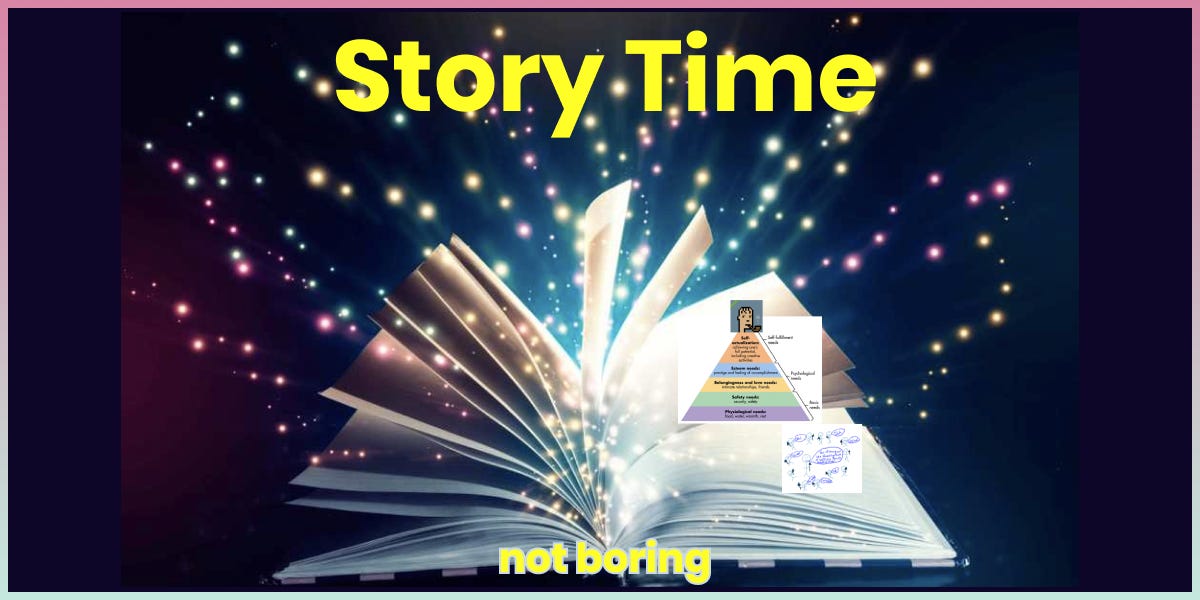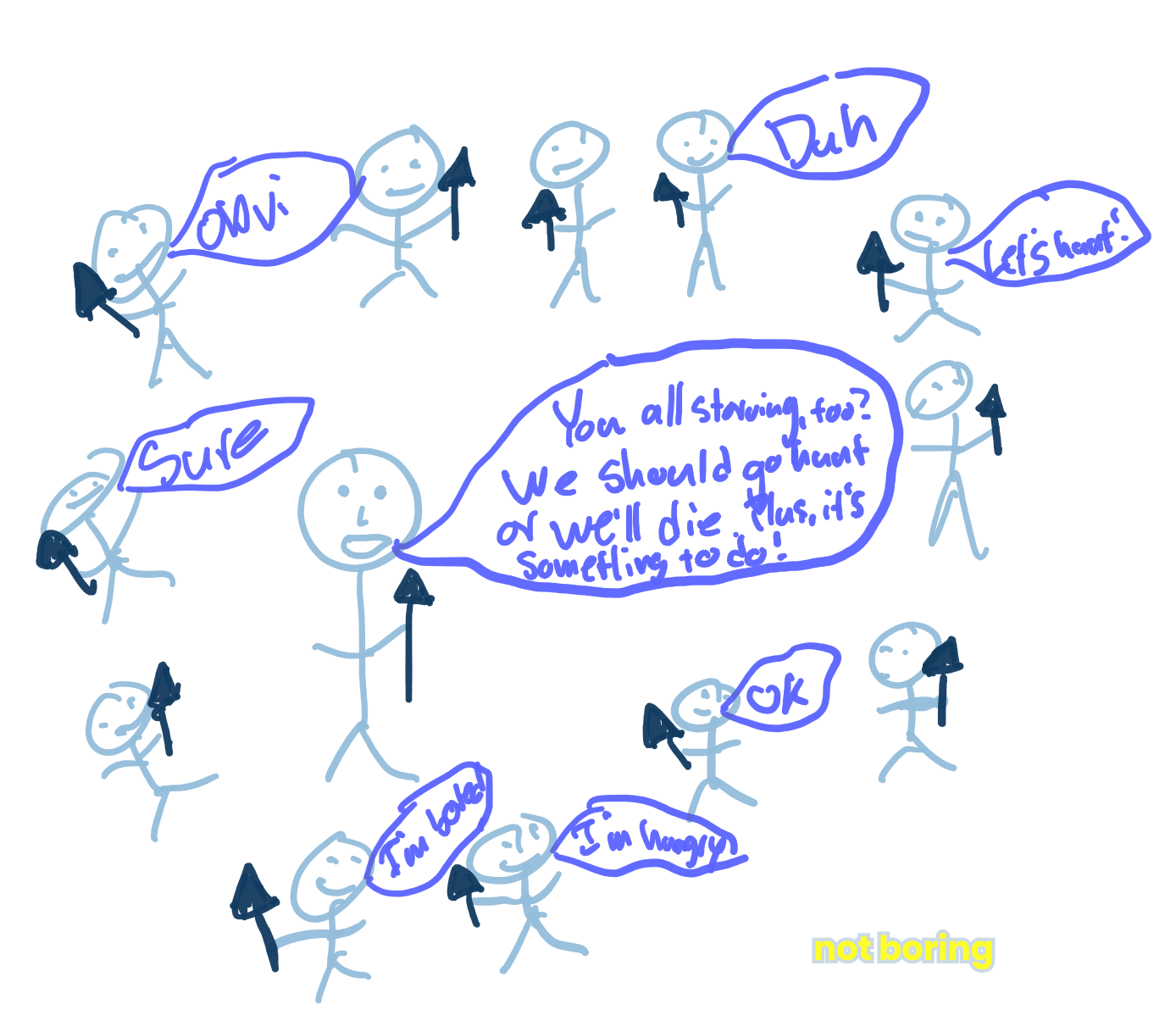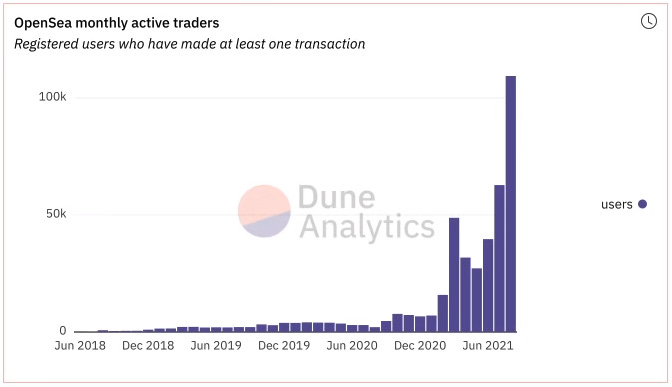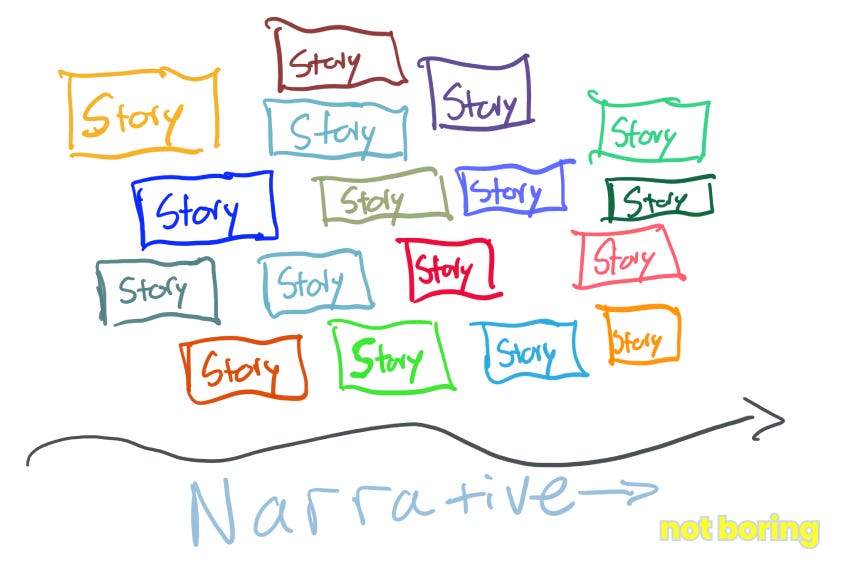Not Boring by Packy McCormick - Story Time
Welcome to the 1,637 newly Not Boring people who have joined us since last Monday! Join 69,350 smart, curious folks by subscribing here: Today’s Not Boring is brought to you by… WorkOS Startups are getting bigger, faster. Not just by valuation, but by actual revenue. The main reason? Better off-the-shelf infrastructure. Modern companies can write a few lines of code to do things that used to take years and millions of dollars in the past. Like, for example, sell into enterprises. WorkOS helps you start selling to enterprise customers with just a few lines of code. WorkOS supports three features that enterprises require of any vendor: Single Sign-On (SAML), Directory Sync (SCIM), and Audit Trail (SIEM). You don’t want to waste your valuable engineers’ time building those yourself. Development teams at fast-growing B2B SaaS companies like Hopin ($5.65B), Webflow ($2.1B), and Vercel (>$1B) use WorkOS to get enterprise-ready in just a few hours. Just like they use Stripe for payments or Twilio for communications. WorkOS unlocks pools of sweet, sweet enterprise money, faster. Get started today with Google auth and magic links included for free: Hi friends 👋, Happy Monday! I spend 90% of my time thinking about stories and narratives, and like so many other things, narrative formation is getting decentralized. This is my attempt to figure out what’s happening and where it’s heading. Let’s get to it. Story TimeCrafting and telling stories is part of what makes humans humans. Stories let us coordinate across time and space. Stories are undeniably important. But as things get more and more abstract, as we move evermore towards a world of abundance, and as more and more of what we do and buy is for things beyond survival -- like social capital, entertainment, and utility -- the ability to weave a good narrative out of a tapestry of little stories is more valuable than it ever has been. How best to do that has changed and gotten a whole lot more complex. Imagine, as a quick and extreme thought exercise, that you lived in a tribe of hunter-gatherers 12,000 years ago. There were about 100 people in your tribe. Many were family members. Food was always the #1 priority. If you needed to convince the men of the tribe to hunt, what kind of story would you need to tell and how would you get the message out? Something pretty simple like, “We need to go hunt now or we will not have meat and we will die,” spoken directly to your fellow tribespeople, probably worked like a charm. Everyone heard the message -- there were no distractions or competing messages -- and everyone understood the immediate importance. So you went out and hunted. Things are obviously not that simple anymore. For one, most people never have to be bored unless they consciously choose to be. There are a million demands on our attention. Plus, we don’t need to hunt for food. We open DoorDash or UberEats or Instacart or GoPuff or Farmstead and food magically arrives at our doorstep in no time. Imagine coordinating 100 people to decide what to eat for dinner tonight. Puja and I have a hard enough time deciding among all the options ourselves. Life is easier, but deciding is more complex. I was reminded of how hard it is to spread a message in a conversation I had at a wedding last weekend. A few friends were talking about why the Olympics’ ratings were so bad. Sure, it was weird not having fans, and sure, America’s best athlete competed less than expected, but the real challenge was, we didn’t know any of the other athletes’ stories. In the past, there would have been months of build-up, with profiles on America’s athletes all over ESPN and The Today Show and in the local newspaper. We all would have been watching the same shows, and those shows would have told stories that convinced us to care. They would have crafted a narrative. One smart friend who works in media asked: “How would you get those stories out to everyone today?” Hint: you can’t. And that’s the Olympics! It’s bringing one of the world’s most beloved brands to the table. On the other hand, in my small corner of the internet, NFTs have completely dominated the conversation. Not everyone in the world is talking about NFTs. Even in the midst of NFT-mania, only 109k people have bought an NFT on OpenSea this month, according to rchen8 on Dune Analytics. NFTs have owned the conversation in a small-but-growing niche, and they’ve done it not by telling one, consistent story -- there is no NFT, Inc. -- but by giving people the tools, ownership, and incentives to go tell the million little stories about NFTs that build up to one loud narrative. In a post last week, The Opening, Union Square Ventures’ Fred Wilson wrote:
The same applies with modern storytelling and narrative-building. I am not saying that NFTs are the next big thing (although I’m bullish). I am saying that the way NFT owners and supporters tell stories is showing the way. In a world of abundance, attentionis the scarcest resource, and peoples’ attention is hard to earn. It requires new tactics. I’m seeing the same shift play out in the areas we talk about so much in Not Boring -- tech, venture capital, markets, and crypto -- from top-down storytelling to bottoms-up narrative building. Owning the narrative can be self-fulfilling, helping companies:
Similar dynamics apply to VC firms, crypto projects, and even stocks. Stories turn into narratives, and narratives have real, measurable impacts. That shift is the foundation of both Not Boring the newsletter and Not Boring Capital. I’m obviously biased regarding the importance of storytelling, but I’ve spent every day for the past 15 months doing it and watching how others do it. Studying narratives has been my fascination. So how do you build a modern narrative? Today, we’ll cover:
From Storytelling to Narrative BuildingEvery day, thousands (millions?) of companies and VC firms launch in-house essays into the abyss. They want to “own the conversation” around X, and so they write about X, and … crickets. They were told content is important, and they made content! Why didn’t it work? Corporate essays are kind of like sales, and according to Alex Danco, we’re past sales and on to something better: world building. (Note: this is separate from the Not Boring concept of Worldbuilders, although successful Worldbuilders certainly use story to great effect.) In World Building, Danco argued that yes, everything is sales, but sales isn’t enough. You need to build worlds. In a world of “abundant narrative and complex choices… You need to build a world so rich and captivating that others will want to spend time in it, even if you’re not there.” That means telling multiple, related stories, and telling them over and over again. It means making your overarching story clear enough that others can repeat it themselves. In a follow-up conversation with Jim O’Shaughnessy on Infinite Loops, Danco provided more color on why world building is important today. There are two reasons, both of which come down to abundance. One reason is practical. There are too many people to sell to directly. The other is strategic. What’s constrained in a world of abundance, when you can read, watch, or listen to anything for practically $0? Attention. Or, as Danco put it, “What is starting to become scarce is people’s actual interest in you.” Stories form the foundations of worlds in which people can spend time without you. In an age of abundant things, and even abundant stories, the ability to tell a great story is a crucial building block. But stories alone aren’t enough. You need to let your community join in painting a narrative. Stories and narratives sound like they’re the same thing. So much so that Writer suggested I drop the “and narratives” because it’s redundant. The dictionary agrees with Writer. Story and narratives are synonyms, according to Merriam-Webster. For our purposes, we’ll distinguish between the two:
If a company writes a blog post about its origins, that’s a story. If an investor goes on a podcast to talk about the company, that’s a story. If the founder writes a thread on Twitter, that’s a story. If a customer tells their friends about a good interaction they had with customer service, that’s a story. If a developer tells other developers the company’s APIs are clean, that’s a story. If TechCrunch reports on their latest funding round, that’s a story. These individual stories add up to form a narrative, which constantly changes and evolves, but has a direction, size, and tone. But a narrative also compounds. Positive stories add up, particularly when they’re positive for the same reason. Stories reinforce stories reinforce stories. A narrative forms. There’s no formula, but the ingredients are:
The best thing for a company or project’s narrative is to have a lot of people with credibility to the target audience tell stories with roughly similar positive themes again and again over a long period of time, with new examples of the same positive themes added in. The more authentic and the less coordinated it all seems, the better. It’s hard to pull off, particularly because so much of it needs to be organic, seeded with just the right amount of direction from the company or team and its core supporters. When it works, though, it’s a powerful thing, the benefits of which compound over time. Benefits compound because narratives are Lindy. The longer people believe something about a company, the longer they’re likely to believe something about that company. A great current example is Apple vs. Facebook. The narrative around Apple is that it’s a world-class design-and-privacy-first company whose products say something good about the people who own them. That narrative began, very intentionally, under Steve Jobs, and it carries through to today. It’s armor. Anything that doesn’t fit the narrative practically bounces right off; anything that feeds the narrative gets added. Claims that the App Store’s 30% take is anti-competitive have barely grazed the company. Apple’s recent decision to put backdoors in iCloud and iMessage has caught the ire of the privacy-passionate, but hasn’t dented the company’s sterling reputation. Facebook’s narrative was formed in articles about its brash and awkward founder, Mark Zuckerberg, in the film The Social Network, in the company’s old “Move Fast and Break Things” motto, in Zuck’s sweaty and stuttering speaking appearances, and in the Cambridge Analytica scandal. Facebook’s positive impact on small businesses, and free WhatsApp messaging service that connects over a billion of the world’s poorest internet users, are rarely discussed. If you looked at both companies’ activities over the past couple of years with fresh eyes, you might think that Facebook is the good company and Apple is the evil company, but we don’t look at anything fresh. We look at everything through a preexisting narrative. Those take time to shift. Zuck hydrofoiling is a step in the right direction, but once a narrative is set, it takes time to shift. The respective narratives may be one reason that Apple, largely a hardware company, trades at a 29x PE, while Facebook, a software company, trades at 26x. These are extreme examples involving two of the world’s most valuable companies, but smaller examples of the same phenomenon play out all of the time. Stripe is a fantastic modern example of a company around which such a strong narrative has been built that it achieves the holy duo: 1) people love talking about Stripe, and 2) they give it the benefit of the doubt when they do. Apple, Facebook, and even Stripe all built their narratives during a time when the competition for attention was less fierce. The tricks that got them here probably won’t work for you. The old way to build a positive narrative was to tell a consistent story about yourself over time. The new way is to have other people tell your story for you, either directly or by association. To learn about how narrative formation is shifting in VC, Startups, and Crypto… Hooka Punk PartyBidI think it would be fun to buy a Punk and shape its story together. To join 82 people who have already committed, head over to PartyBid and throw in some ETH (for fun, not investment advice!) 💼 Not Boring Jobs 💼
To find yourself a Not Boring Job, check them all out here. If you want to feature your job to 69,350 smart, curious people, reply to this email and let me know! Thanks to Dan and Puja for editing! How did you like this week’s Not Boring? Your feedback helps me make this great. Loved | Great | Good | Meh | Bad Thanks for reading! Packy If you liked this post from Not Boring by Packy McCormick, why not share it? |
Older messages
Lithic's New Customer
Friday, August 13, 2021
Meet the $800M 💳 🚀 Making Issuing Cards as Easy as Accepting Payments
Status Monkeys
Monday, August 9, 2021
Analyzing NFTs as Social Networks Using the Status-as-a-Service Framework
Compounding Crazy
Monday, August 2, 2021
Everything is moving so fast out there. What if it's just getting started?
Is That a Family Office in Your Pocket?
Thursday, July 29, 2021
Or are you just a happy Equi client?
Together, More Bull, More Bear, More Fun
Monday, July 26, 2021
Pinduoduo: A Chinese Characteristics x Not Boring Collab
You Might Also Like
🔮 $320B investments by Meta, Amazon, & Google!
Friday, February 14, 2025
🧠 AI is exploding already!
✍🏼 Why founders are using Playbookz
Friday, February 14, 2025
Busy founders are using Playbookz build ultra profitable personal brands
Is AI going to help or hurt your SEO?
Friday, February 14, 2025
Everyone is talking about how AI is changing SEO, but what you should be asking is how you can change your SEO game with AI. Join me and my team on Tuesday, February 18, for a live webinar where we
Our marketing playbook revealed
Friday, February 14, 2025
Today's Guide to the Marketing Jungle from Social Media Examiner... Presented by social-media-marketing-world-logo It's National Cribbage Day, Reader... Don't get skunked! In today's
Connect one-on-one with programmatic marketing leaders
Friday, February 14, 2025
Enhanced networking at Digiday events
Outsmart Your SaaS Competitors with These SEO Strategies 🚀
Friday, February 14, 2025
SEO Tip #76
Temu and Shein's Dominance Is Over [Roundup]
Friday, February 14, 2025
Hey Reader, Is the removal of the de minimis threshold a win for e-commerce sellers? With Chinese marketplaces like Shein and Temu taking advantage of this threshold, does the removal mean consumers
"Agencies are dying."
Friday, February 14, 2025
What this means for your agency and how to navigate the shift ͏ ͏ ͏ ͏ ͏ ͏ ͏ ͏ ͏ ͏ ͏ ͏ ͏ ͏ ͏ ͏ ͏ ͏ ͏ ͏ ͏ ͏ ͏ ͏ ͏ ͏ ͏ ͏ ͏ ͏ ͏ ͏ ͏ ͏ ͏ ͏ ͏ ͏ ͏ ͏ ͏ ͏ ͏ ͏ ͏ ͏
Is GEO replacing SEO?
Friday, February 14, 2025
Generative Engine Optimization (GEO) is here, and Search Engine Optimization (SEO) is under threat. But what is GEO? What does it involve? And what is in store for businesses that rely on SEO to drive
🌁#87: Why DeepResearch Should Be Your New Hire
Friday, February 14, 2025
– this new agent from OpenAI is mind blowing and – I can't believe I say that – worth $200/month








